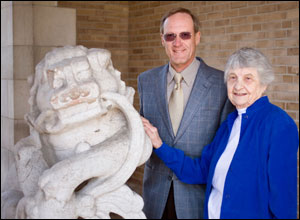New Partnership to Strengthen Science, Health, Environmental Journalism Announced
The School Will Join Forces with the Pulitzer Center on Crisis Reporting in a Multi-Year Program
Columbia, Mo. (Jan. 5, 2017) — The Missouri School of Journalism will join forces with the Pulitzer Center on Crisis Reporting to enhance the School’s emphasis on science, health and environmental journalism in a multi-year program.

The Smith/Patterson Science Journalism Fellowship and Lecture Series, a joint initiative of the Pulitzer Center Campus Consortium and the Missouri School of Journalism, will provide campus visits from leading journalists in the field and an annual $5,000 international science reporting fellowship for a Missouri journalism student. This joint initiative brings the Missouri School of Journalism into the Pulitzer Center’s Campus Consortium network.
Founded in 2006, the Pulitzer Center supports journalism on underreported stories around the globe, including issues such as the impact of climate change, environmental contamination from gold mining, and road traffic as a public health threat. To date, the Pulitzer Center has supported the reporting projects of hundreds of professional journalists and student fellows, and created an innovative educational program bringing international issues to diverse classrooms and college campuses.
“Journalists face a difficult task in understanding and translating complex scientific topics. These stories need to be told with clarity and accuracy,” said David Kurpius, dean of the School. “The Smith/Patterson program and this new partnership with the Pulitzer Center will greatly enhance the education and experiences we are able to provide our students.”
The program builds on the work of the Smith/Patterson fellowship and lecture series, established in 2008 by alumnus Russell G. Smith II and his wife, Gail, in honor of Joye Patterson, Smith’s former Missouri School of Journalism professor and mentor. Patterson, who died in 2012, joined the faculty of the School in 1965 and taught science journalism courses until her retirement in 1989. Colleagues often credit her with inventing the modern approach to teaching science writing.
“Joye Patterson led me to the understanding that exciting science, medical, environmental and technological discovery needs to be reported and distilled into understandable news topics that appeal to the average reader or viewer,” noted Smith. “The more people learn about scientific advances and the incredible daily technology changes around our world, the better they will be able to adapt to future events. It’s our responsibility, as journalists, to unravel discovery and make it meaningful for all readers,” he said.

The Smiths donated $100,000 in 2008 to create and endow the program. Additional support from the couple and the endowment’s annual earnings will continue to underwrite the fellowship and lecture series during this partnership.
The first student fellowship will be awarded in summer 2017. The $5,000 stipend will cover international travel and expenses associated with the student’s project, which must focus on an under-reported issue in science, health or environmental journalism. Pulitzer Center staff and journalists will provide the student with mentoring and editorial feedback. The fellow’s work will be disseminated through Pulitzer Center platforms with the potential for dissemination across other outlets.
The Pulitzer Center will facilitate multi-day visits at the School with leading journalists who bring fresh-from-the-field insights into the classrooms and through public lectures. The first visiting professional will be two-time Pulitzer Prize-winning photographer Larry C. Price, who has covered the effect of mercury exposure from gold mining. Price’s visit is planned for April 2017.
Assistant Professor Sara Shipley Hiles will oversee the new program. During her career as a professional journalist, Hiles covered the environmental beat for the St. Louis Post-Dispatch and The Statesman-Journal in Salem, Oregon. As the faculty adviser to the student group Science, Health and Environmental Journalism @ Mizzou, she helped bring Pulitzer Prize-winning reporter and National Geographic staff writer Craig Welch to campus in April 2016. Welch, who received support from the Pulitzer Center, presented “Sea Change,” his award-winning multimedia project for The Seattle Times about the impact of climate change on the world’s oceans.
An A.P. Sloan Foundation Fellow, Smith earned two degrees from MU, the Bachelor of Journalism in 1967 and the Master of Arts in 1971 with a focus in science writing and public relations. He is the managing partner of MYRUSH Futures, LP, a Midwest investment property, communications and consulting firm. Previously, he was the Missouri division president of May’s Drug Stores Inc., based in Tulsa, Oklahoma. Gail Smith received the Bachelor of Arts degree in education from MU in 1968.
Patterson received two journalism degrees at MU, the Master of Arts in 1962 and the Doctor of Philosophy in 1966.
Updated: June 15, 2021